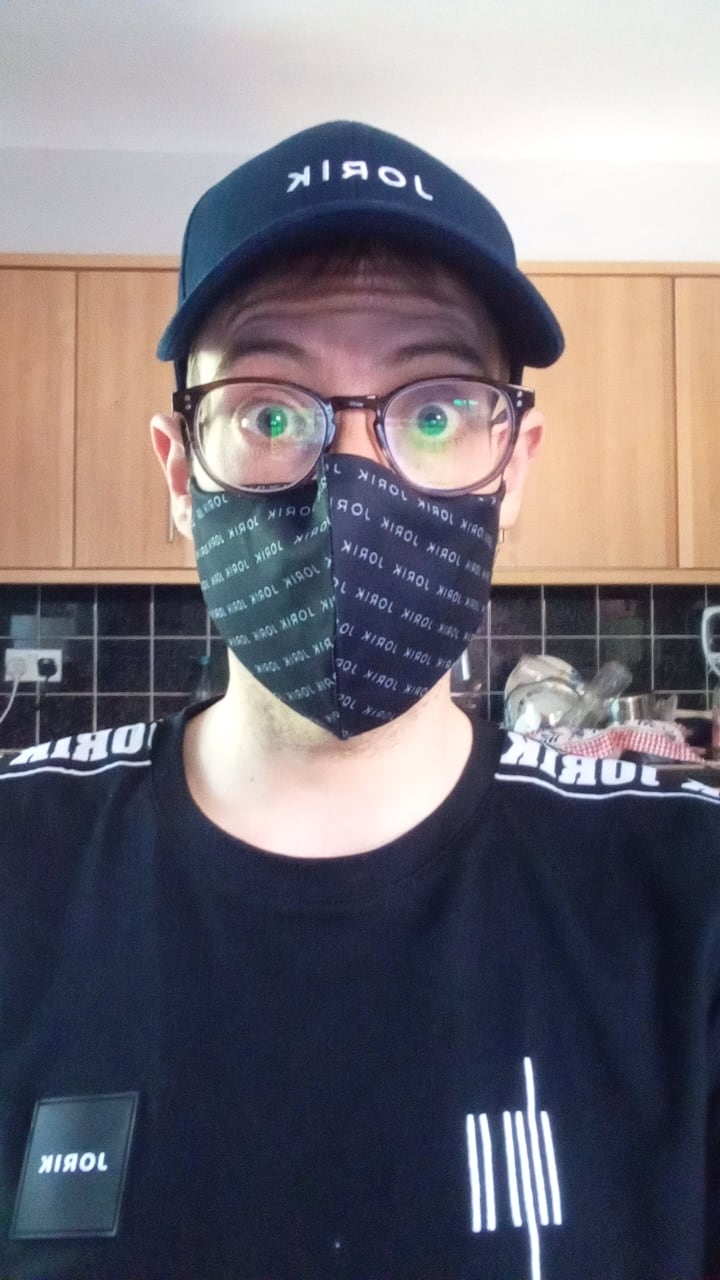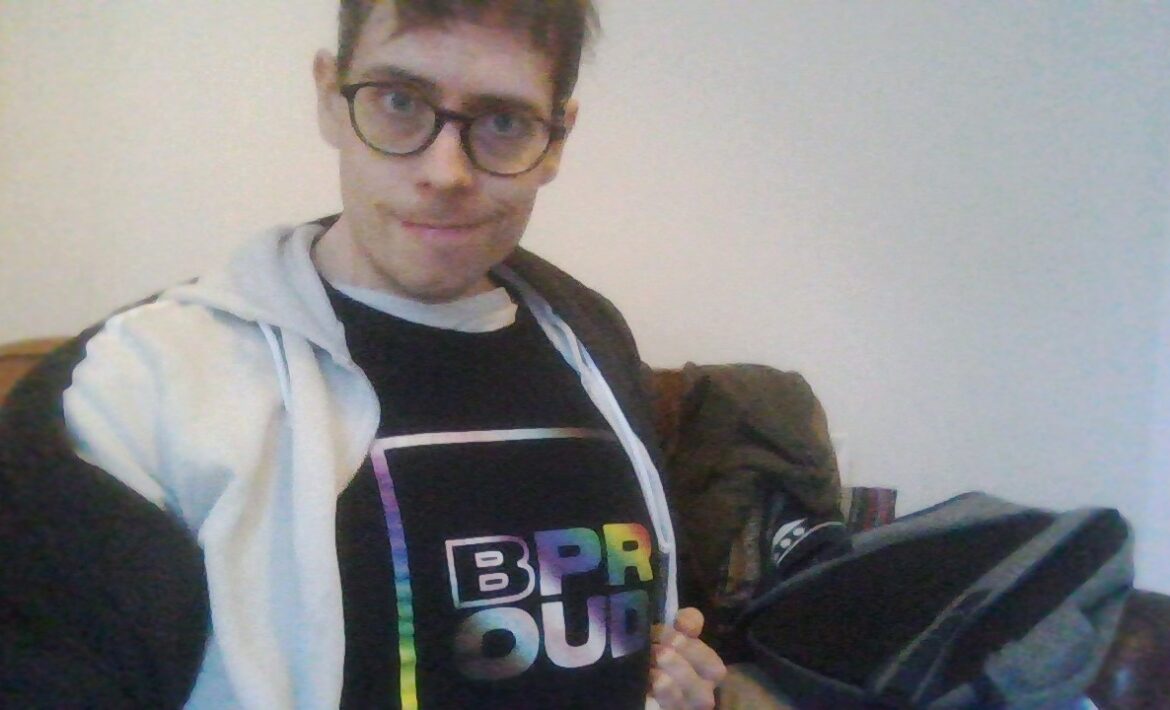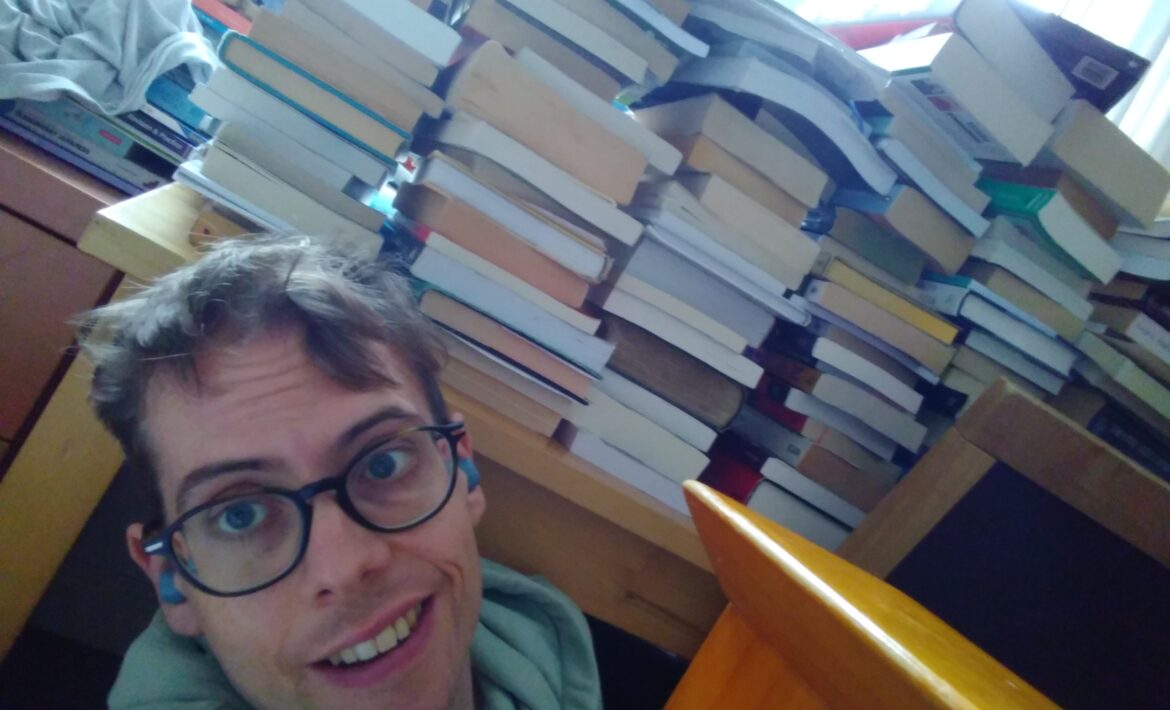
Tuesday 1st June 2021 – Pride Season: LGBTQIA+ people and Neurodiversity – on Intersectionality
Hi everyone,
Hope you’re well. I’ve had a weekend of mostly being in bed recuperating. I have had a 6 week term of teaching without any meltdowns or crashes or utter breakdowns, but by Friday I was absolutely exhausted. I had nothing left to give. I am now allowing myself to have those days where I need to rest.
My mother did do me a great service by ordering and then sending me a set of clothes imprinted with my own name. Or, rather, the name of a Dutch rapper who now made me the fourth-most famous Jorik on the internet. But, then again, he was arrested in Spain the other day. I haven’t even been to Spain. Who’s winning now? (it’s clearly me).
Instead of going to Spain (the UK must still be on its red list, I assume), here’s the first of 5 blogs about the intersection of being LGBTQIA+ and neurodivergent. I will start with a TL;DR and a link to the revised version of my recent blog on autistic Dutchness.
TL;DR Autistic and Queer
Revision of ‘Autistic and… Dutch?’
With the input of some fellow Dutch people, I revised my blog on Dutchness and autism. Here it is: https://jorikmol.com/sunday-4th-april-2021-autistic-at-times-of-covid-19-autistic-and-dutch/
Have a read, there are some interesting additions.
Pride
I was asked by Oxford University Press if I could commit to writing a blog they could share, particularly on the topic of Pride. I am. I am actually writing a full month of blogs on the topic.
And it’s not just me. The month of June, worldwide, has become known as Pride month, as in June 1969, in New York’s City’s Greenwich Village, the patrons of the Stonewall Inn stood up against decades of police brutality; primarily trans women, gender non-conforming folks, homeless people and people of colour. The first Pride was a riot. It was an anti-police riot, that countered the brutality of homophobic police practices.
I have already spoken at length about how my neurodivergence and queerness are fundamentally interlinked, here on this podcast. If you haven’t already, please give it a listen (if you have, please share it. Sarah is amazing and her voice deserves to be heard, even if I crowd it out a bit on this episode).
I will speak more about how my idea of Autistic Pride is involved with this in the last blog of the series, which will be a version of the talk I’ll be giving at Autistic Pride online in June. This will be aimed primarily at other autistics. For now, let’s keep focused on queer identity.
Intersectionality
A while back, I was asked an interesting question. In the research community (which I’m tangentially part of) there are a lot of discussions on how to engage early-diagnosed autistics. Most people who join studies are late-diagnosed. When I was asked how we engage with early diagnosed-people, I said “look in arts and hobby organisations. In writing groups. In healthcare, social care and music. In LGBTQIA+ groups. That’s where you’ll find us.”
I stand by that. Many autistics are, in some way LGBTQIA+; or queer, which is what I’ll be using throughout this blog. The terminology around queerness, sexuality and gender is a contested one, the term ‘homosexuality’, for instance, being a relatively recent invention compared to the millennia of divergent sexual attraction and gender identity. If you would like a greater understanding of why I use the word queer, please watch/listen to these two excellent people:
I listened to a previous episode of 1800 Seconds on Autism about queerness and gender, find it here: https://www.bbc.co.uk/programmes/p0959q3y Lyric Holmans, who is on the internet as Neurodivergent Rebel, guests on this episode. They did a straw poll on Twitter and found the majority of autistic people who took part in the poll did identify as LGBTQIA+
Neurodivergent Rebel talks about the concept of ‘autiegender’. This is a form of genderfluidity that is particular to autistic people. This is not an extra letter on the LGBTQIA+ acronym, but it represents a higher preponderance of gender variance in our community. It says something about autistics, rather than about gender. Lyric speaks best for themselves, so please listen to the podcast (it uses their previous name, Crysta. I put this here not to deadname them, only to avoid confusion as the podcast hosts address them under a different name).
To be blunt: any discussion of autism and neurodiversity that doesn’t take queerness into account is not doing its job. Why not? Being neurodivergent is an identity. You are ND in the same way as you are queer. It is something fundamentally bound up with your personality. Whether either of these are genetic, nature, nurture or a combination of these is utterly beside the point. What is important is to celebrate and value the human beings that we are, just as we would any other.
Our queerness and gender divergence are often dismissed and diminished, under the auspices of ‘person-centred care’ or an out-of-date education system.
Homophobia/Transphobia
If not supported appropriately, things can also go badly wrong. This article shows the intersection of autistic people and radicalisation. If you live in a society that despises you due to the intersections of your identity, many autistic people, primarily assigned male at birth, dive into the aspects of their identity that do give them power. Ethan Stables hated the fact he is queer, so, in order to ‘become straight’, he planned an attack on a Pride venue, to the praise of those around him. In this case, a lot of people’s lives were saved: https://www.theguardian.com/uk-news/2018/feb/05/man-found-guilty-planning-terror-attack-cumbria-gay-event-ethan-stables
Autistic boys have a terrible reputation as school shooters, as often as autistic girls are forgotten entirely. We may not be school shooters (we tend to get caught early, which I’m eminently thankful for) but autistic boys, particularly teenagers, are very vulnerable to radicalisation. I know autistics who were far-right before they came to grips with their queerness in gender, sexuality or both. As with the case above, if our sense of dignity is routinely taken away from us by an uncaring world, we get bitter. That bitterness can come as apathy, as a need for control and as rage. Rage is more socially accepted for boys to show, so autistic transwomen and queer cis men are hugely vulnerable to being radicalised. If they just try hard enough, they can ‘straighten’ themselves out.
I have permission to use the story of a friend of mine who’s autistic and trans. It is important that I gender her here, which I wouldn’t otherwise do due to concerns about her safety online and in real life. The internet gives women a far harder time than men, especially transwomen. It is relevant here to say that she is a she and that for most of her life she had to pretend to be a he.
Being forced to be something you’re not is all-too common for our community. Add gender and sexuality to the mix, and you’re in trouble. My friend also had class to contend with. As a high achiever in their otherwise resource-poor school in a working class area, she was seen as an example for the younger boys. If they’d work like my friend, they could make it too. When she got to university, she dropped out in the first year. A very common experience for us.
I don’t want to focus too much on the medical and educational system here. I will discuss conversion therapy in next week’s blog. But to be clear, internalised homo- and transphobia are real, even for autistics. It’s indicative of the contempt in which we’re held by society that we are not seen as being able to make decisions about our gender or sexuality. That works its way inside, to fester and rot.
Depression, in autistics, often communicates itself in rage, a rage many on the internet are only too happy to take advantage of. I have written about radicalisation before, of course, but my friend’s gender and sexuality (she’s the L in LGBTQIA+) let her to dark places on the internet, where the far right lurks.
This is not to say that other political stripes do not have the capacity to recruit autistics as foot soldiers. So-called “radical Islamism” is nothing but far-right politics from a different religious perspective. Also, in the news, the neurotype of young men radicalised is never commented on, whereas their race and religion always are. To say that ‘left-wing terrorism’ exists in Britain, Holland or the US in 2021 is to be historically and intellectually dishonest (not that this has ever stopped anyone but hey there you go). In a context-free paradise it is possible that leftwing radicals seek out autistic boys and get them to join their cause.
The point here is that these autistic ‘boys’ have to grasp on to the aspects of their identity that privilege them, such as their race, religion and heteropatriarchal masculinity. They don’t have a choice. In order to have any value to the community that they find themselves in, they have to act in increasingly extreme ways.
By the time that violence is necessitated, they are put in the firing line. Their lives have no value to the men who radicalise them, because the fact they are clearly queer and neurodivergent disqualifies them from the image of masculinity that these groups promote.
Coming out
It can take years for autistics to understand our own sense of queerness, because we grow up in a society that gaslights us on a daily basis and tells us we should be neurotypical. This means we often struggle coming out earlier.
We are more likely to identify as lesbian, gay, bi or pansexual since our sexuality just happens to not often develop towards the norm. We are more likely to come out as trans later, since being trans is still so stigmatised, both for transmen as for transwomen. We are more likely to be non-binary, because our sense of self is often outside of the rigid norms of either male or female. We are more likely to identify as ace or demisexual, not just due to sensory sensitivity, but because sexual desire is complex and so are autistic hearts. My partner is demisexual and fell in love with me because of my personality, not primarily because I’m cute. Although he cannot deny I am. No-one can. I’m super cute.
To confuse asexuality in autistics for sensory sensitivity is to make a serious mistake. As serious a mistake to think that trans and LGBP autistics are just ‘confused’. Yes we are confused. You made us confused. Living in a society that isn’t made for us does that all on its own. But even if we’re gaslighted, traumatised or struggle with alexithymia, we know what feels right. It might take us a bit longer to figure it out.
Coming out is hard. It took me decades. I hated it. But when you realise that you deserve love in the ways that work for you, then you will find it. One of my friends is aro-ace and loves life because of that, rather than despite not being interested in a partner.
When my friend came out as trans and started her transition, this was the one thing that made life worth it for her. In my case, I now realise I was carrying so much pain due to constantly checking myself for not coming across too gay. I love my body now and I love how it makes me feel at home. But I would have never joined an LGBTQ+ group, even as a student in Amsterdam. Coming out is hard and no-one should force anyone to come out. But, if you can, you should. Coming out can be painful and not everyone has the privilege to do so (I spoke about this extensively in a previous post).
Online vs. Face-to-face
Living in the hellhole that is 21st century life – by this I mean being on the internet – means that the discussion about queer life is also out in the open. Great steps have been taken, but we need to now focus on representing those parts of the community that are still under-represented. Those people deserve a voice. I use mine to uplift those of others. There are also things I can’t do. I’m very much not on twitter, neither am I on facebook. Others are computer-illiterate. There’s absolutely nothing wrong with that. Some find social media exhausting and overwhelming. I certainly do.
The online space does have the advantage of being less reliant on face-to-face communication skills than the offline one does. I don’t have to mask as hard online, because I can withdraw if I need to. Once things open up again, we need to keep focused on how important it remains to not crowd out neurodivergent voices in queer spaces, even if that means turning the music down.
My friend has faced ableist discrimination from neurotypical transpeople, transphobia from autistics and homophobia across the board, even in queer venues. Myself, I’ve faced ableism and aggression at queer venues for being autistic. I will be happy to help support the inclusions of not just one specific type of homonormative white person; queer venues are utterly vital to our entire community, not just the privileged few.
What now?
Let’s live, celebrate and keep on battling for what’s right for our entire community. We have some way to go, but we’re on our way.
Thanks for reading!
This was the first of five blogs I will write during Pride month. I will also be a featured speaker at the annual meeting for AUPresses (the worldwide association of University Presses). I am sharing the bill with these amazing people: https://web.cvent.com/event/201535f3-e794-49da-ac64-413a15c6eb11/summary?RefId=AUPresses2021 (spoiler: Nikole Hannah-Jones is one of them!!!)
I am unironically joyful to be the only white person who’s a plenary speaker. Finally, the world is getting better at inclusion.


